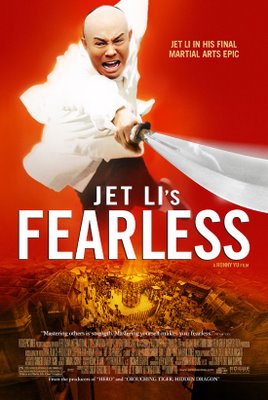 On a rare night out, my husband and I saw Jet Li’s Fearless, a film based on the life of legendary Whushu martial arts master Huo Yuan Jia—and, while it wasn’t as good as it could be, I found this film brimming over with God-talk.
On a rare night out, my husband and I saw Jet Li’s Fearless, a film based on the life of legendary Whushu martial arts master Huo Yuan Jia—and, while it wasn’t as good as it could be, I found this film brimming over with God-talk.The film opens with a young asthma-stricken Huo, who is humiliated by his father’s defeat in a public duel (I was late to the film, but I think Huo’s father loses because in honor he held back his final blow, which could have killed his opponent). His father refuses to teach him the arts due to Huo’s physical aliments, and steers him into academic studies instead. But Huo—determined to revenge his injured pride—secretly trains and, as a young man, becomes the best fighter in his region. But his consuming pride to be the strongest and best combined with his incredible fighting skill result in the death of another local Whushu master, which prompts a loyal disciple to kill Huo’s family in revenge. In deep grief and anger, Huo goes to take revenge himself, but when confronted with his dead rival’s frightened wife and young daughter, he flees in horror at his heart’s intention.
As he stumbles through the countryside in grief, he falls into a lake and allows himself to sink. But he’s pulled from the water by a group of simple villagers, who with generosity and kindness nurse him back to health—both physically and spiritually. As he lives with them, he gradually learns a new way to live life, one that is not based on pride and fear but on love and surrender. And this is what guides him in the latter part of his life, when he works to unite China through their martial arts.
As I’ve written before, when epic martial arts films are at their best (and this one is pretty good) they resonate on many levels: sacrifice versus self-fulfillment, forgiveness versus revenge, love versus fear, as well as redemption and hope. And this film is no exception.
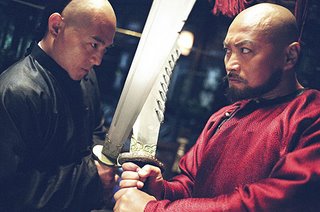 There are some key scenes in the film that accentuate these themes, the most dramatic of which is the effect of revenge. On the day we saw this film, we’d just studied the section of Romans 12 where Paul says to leave revenge to God so that we can live in peace with each other. This film vividly demonstrates how revenge utterly destroys lives and community. But the film also illustrates that when the “right” for revenge is given up and forgiveness is embraced, community and life are not only woven anew, but grows stronger and more united and more vibrant than most dream possible.
There are some key scenes in the film that accentuate these themes, the most dramatic of which is the effect of revenge. On the day we saw this film, we’d just studied the section of Romans 12 where Paul says to leave revenge to God so that we can live in peace with each other. This film vividly demonstrates how revenge utterly destroys lives and community. But the film also illustrates that when the “right” for revenge is given up and forgiveness is embraced, community and life are not only woven anew, but grows stronger and more united and more vibrant than most dream possible.The themes are also highlighted by the use of effective symbolism. One such instance involves the town’s fighting platform, where Huo as a young man stands and imagines the crowd’s cheering and accolades as he beats his opponents. Later, after Huo kills the other town master, the town-idiot is standing on the platform leaning over a vomiting Huo in the dust below, hailing him as a champion. An effective depiction of the madness of pride.
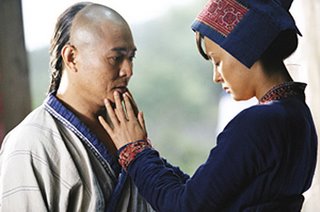 Another key image crops up when Huo falls into the lake expecting to die, but is pulled from it by the villagers—a poignant symbol of baptism: death to an old way of life and birth into a new one. Huo is given grace, love, kindness, generosity and accepted into a new life by those who don’t give a lick about who he was before or what he’d done. It is both amusing and moving to watch Huo transformed and redeemed by his life in the village, as he learns his old way of life has no place in this new community, and his gifts are transformed from slavery to his pride to service in something greater than himself.
Another key image crops up when Huo falls into the lake expecting to die, but is pulled from it by the villagers—a poignant symbol of baptism: death to an old way of life and birth into a new one. Huo is given grace, love, kindness, generosity and accepted into a new life by those who don’t give a lick about who he was before or what he’d done. It is both amusing and moving to watch Huo transformed and redeemed by his life in the village, as he learns his old way of life has no place in this new community, and his gifts are transformed from slavery to his pride to service in something greater than himself.This section of the film, in my opinion is the best. It depicts well what happens we move into God’s way of life. We discover that our old way of life has no place here--it won't work. Instead, we learn a new way of living, both from our brothers and sisters who are already there (indeed, it would be hard to separate transformation from community) as well as the Spirit (who is the life that dwells and moves within us). We learn to live in a kingdom where our gifts and vision are freed from our own pride, agendas and fears and placed in the service to a loving and incredibly generous Father. In the process, like Huo, we find our life full of a much deeper meaning and purpose and joy than we ever dreamed possible.
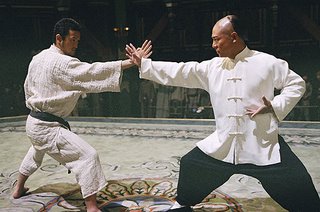 Another key scene in the film occurs as Huo explains to a Japanese opponent over tea the value of competition as learning versus winning. Competition, says Huo, uncovers our weakness to help us along the path to self-discovery. In that kind of philosophy, losing is just an opportunity to learn. There is no fear or pride here—everything is opportunity to learn and grow.
Another key scene in the film occurs as Huo explains to a Japanese opponent over tea the value of competition as learning versus winning. Competition, says Huo, uncovers our weakness to help us along the path to self-discovery. In that kind of philosophy, losing is just an opportunity to learn. There is no fear or pride here—everything is opportunity to learn and grow.And that reminds me of Romans 5, where Paul tells us that hardship is just an opportunity to watch a powerful and loving God in action. We don’t need to fear any situation or circumstance life brings us, because God will work through it to reveal himself, his power and his glory, to redeem his creation (Romans 8). Everything is an opportunity to grow in trust of God—and we can trust him because we know he loves us (he demonstrated that especially through Jesus) and won’t let anything separate us from that love or him (Romans 8). And, as John says so well over and over in his letters, when we get how perfect God’s love is, it drives out all our fears.
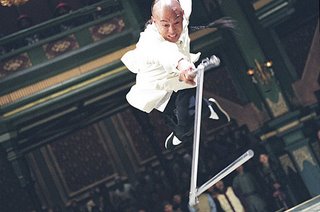 And one last element in the film worth noting: Who can talk about a Jet Li film without mentioning Li’s martial arts abilities. Though Li is definitely not as fast as he was in his earlier films, this dude can move. He’s pure beauty to watch.
And one last element in the film worth noting: Who can talk about a Jet Li film without mentioning Li’s martial arts abilities. Though Li is definitely not as fast as he was in his earlier films, this dude can move. He’s pure beauty to watch.The film does have it weaknesses. First of all, it doesn’t have the depth that a story like this is capable of. This is one film I felt could have been half-hour longer. Also, while I like director Ronny Yu’s philosophy behind the film, I’m not that fond of his directing in this one and would like to have seen what Crouching Tiger, Hidden Dragon’s Ang Lee could have done with it. In addition, Li’s acting in the first third of the film feels a bit forced and some of the scenes feel very contrived.
But overall, I enjoyed the film and found it full of more than enough God-talk to bring into open spaces.
(Images: Rogue Pictures)